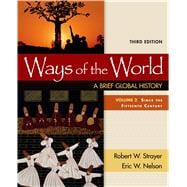
Note: Supplemental materials are not guaranteed with Rental or Used book purchases.
Purchase Benefits
What is included with this book?
New co-author Eric Nelson brings an enhanced focus on teaching in today’s classroom. Eric Nelson, a popular and skilled teacher who has become a national leader in online course design and pedagogy, joins Bob Strayer as co-author of Ways of the World.
More on the environment and Pacific Oceania gives students expanded coverage of important topics. The third edition includes enhanced treatment of environmental issues in world history, including a more thorough account of environmentalism and climate change during the past century. Expanded coverage of Pacific Oceana throughout – including new in-depth coverage in Chapter 6 – rightfully positions this distinctive cultural region alongside the other regions of the world, while underscoring the truly global approach of this book.
"Zooming In" features link specific people, places, and events to big themes in world history. Two "Zooming In" features in every chapter call attention to particular people, places, and events, situating them in a larger global context. Incorporating many of the biographical "portraits" from the last edition, topics include the Buddhist "university" of Nalanda, the Ottoman devshirme, the civil war in Mozambique, and many more.
New source collection topics bring a fresh perspective and build skills in working with evidence. Retitled "Working with Evidence," the primary source-based collections at the end of each chapter offer many new and unique textual and visual sources that allow students to consider evidence like a historian. New sources and topics include a feature in Chapter 3 that probes outsiders’ accounts of Persia and Egypt, the Germanic peoples of Central Europe, and the Xiongnu living to the north of China; "Voices of European Socialism" in Chapter 17; and conflicting views of Islam and women’s dress in Chapter 22, among many others.
Assignable online document projects in LaunchPad allow students to put interpretation into practice. New "Thinking through Sources" activities in LaunchPad extend and amplify the "Working with Evidence" source projects from the book. Surrounded by a distinctive and sophisticated pedagogy of auto-graded exercises, these interactive activities guide students in assessing their understanding of the sources, in organizing those sources for use in an essay, and in drawing useful conclusions from them. Designed to build arguments and to practice historical reasoning, this unique pedagogy does for skill development what LearningCurve does for content mastery and reading comprehension.
Learn more about the "Thinking through Sources" activities in LaunchPad
"Another Voice"features with Eric Nelson in LaunchPad enhance the treatment of particular issues. Topics include the imperial styles of empires in the second wave era (Chapter 3); the Mongol legacy (Chapter 11); the relationship between technology and trade with Europe’s oceangoing ships (Chapter 14) and the future of industrial development (Chapter 22). Sometimes gently arguing with the narrative text, the features demonstrate that history is a dynamic and constantly evolving discipline.
The New copy of this book will include any supplemental materials advertised. Please check the title of the book to determine if it should include any access cards, study guides, lab manuals, CDs, etc.
The Used, Rental and eBook copies of this book are not guaranteed to include any supplemental materials. Typically, only the book itself is included. This is true even if the title states it includes any access cards, study guides, lab manuals, CDs, etc.